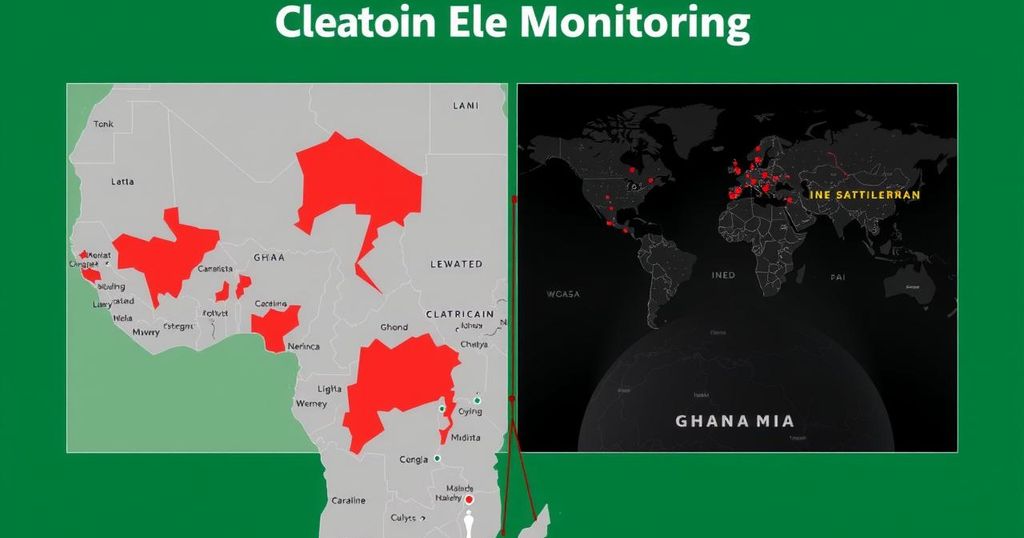Ghana will conduct pivotal elections on December 7, 2024, where voters will choose a new president and parliamentary representatives. The contest is primarily between the NDC and NPP, amid significant economic challenges and concerns over electoral integrity. Current candidates are Mahamudu Bawumia and John Mahama. Potential voter violence could threaten democratic stability, making the peaceful conduct of the election crucial for both Ghana and the wider West African region.
On December 7, 2024, Ghana will hold significant elections where citizens will select a new president and parliamentary representatives across 275 constituencies. The electorate faces twelve presidential candidates; however, realistically, the competition is between the National Democratic Congress (NDC) and the ruling New Patriotic Party (NPP), with the incumbent President Nana Akufo-Addo unable to seek re-election due to term limits.
The electoral atmosphere is heavily influenced by economic hardships and political tensions. Primary voter concerns include the economy and the rising cost of living, exacerbated by the Ghanaian cedi losing approximately two-thirds of its value against the US dollar over the past five years. Additionally, the NDC has expressed concerns about the Electoral Commission’s transparency and has delayed signing a peace accord with the National Peace Council aimed at ensuring a peaceful election process. A report from the International Republican Institute (IRI) has highlighted corruption, financial mismanagement, and practices such as vote buying, which have marred past elections, contributing to political instability.
While the voter turnout in the last election in 2020 reached a noteworthy 78.89 percent, the upcoming election could potentially see similar or higher participation rates. Nonetheless, concerns about possible electoral violence remain, threatening the democratic fabric of Ghana. The nature of a winner-takes-all electoral system creates intense competition, leading parties to resort to resource abuse, fear tactics, and violence as they seek to secure victory. The 2020 elections serve as a painful reminder, having resulted in the loss of five lives due to election-related violence.
The main candidates vying for the presidency are Mahamudu Bawumia of the NPP and John Mahama of the NDC, both seasoned political figures. Bawumia served as vice-president under Akufo-Addo for eight years and has held senior roles within the Bank of Ghana. Mahama previously held the presidency from 2012 to 2017, losing to Akufo-Addo in 2016. The focus of this election is significantly on the ambition of the NPP to “break the eight” by securing a third consecutive term in office.
The outcomes of this election hold profound implications for Ghanaian democracy, which has historically served as a pillar of stability in West Africa. Given the backdrop of increasing regional instability and a concerning trend of democratic regression, supporting a transparent and peaceful election process in Ghana is critical. The stakes are high, as the election results will not only impact Ghanaian citizens but also resonate throughout the region, with potential repercussions on the broader democratic landscape in West Africa.
The context surrounding the upcoming elections in Ghana is shaped by a history of political competition and democratic commitment. Since the re-establishment of multiparty politics in 1992, the NDC and NPP have dominated the political scene, reflecting a critical aspect of democratic governance. Different administrations have grappled with issues like economic management and political integrity, and the current economic situation poses significant concerns for voters. The commitment of political parties to uphold democratic principles and ensure a peaceful transfer of power has become paramount amidst threats of violence.
In summary, the forthcoming elections on December 7, 2024, represent a crucial juncture for Ghana’s democracy. With economic challenges and potential threats of violence looming over the election landscape, the need for transparency and peaceful electoral conduct is essential. The outcome may not only determine the direction of Ghana’s policies but also solidify or undermine its reputation as a democratic leader in West Africa. As such, the international community and regional stakeholders must remain vigilant in supporting Ghana’s electoral processes.
Original Source: www.iri.org






